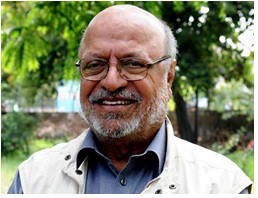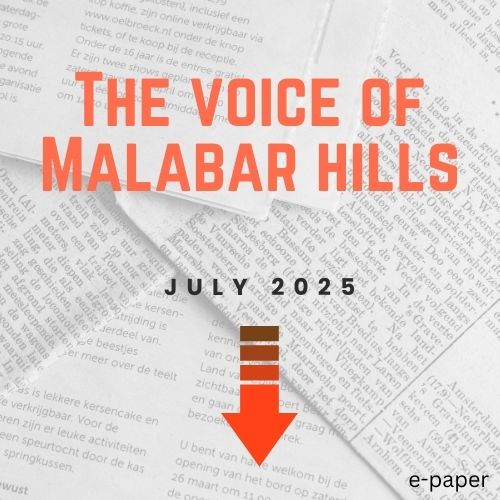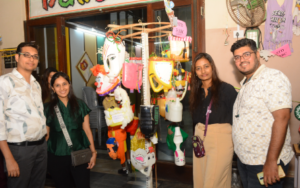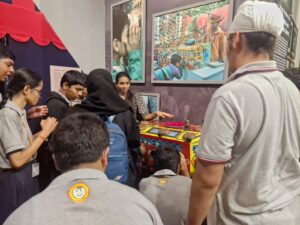
We are delighted to publish this article about Shyam
Benegal, our Pedder Road resident. He is one of the pioneers of the Indian
parallel cinema. He is known internationally for his highly creative and
socially relevant films.
Residents in our neighborhood describe him as a humble and
always smiling man despite receiving eighteen National Film Awards, several
Filmfare Awards and many other prominent awards. Honoured with both, the Padma
Shri and Padma Bhushan, two of India’s highest civilian awards.
Shyam Benegal was born in 1934 into a konkani speaking
Chitrapur Saraswat Brahmin family in Hyderabad. His father Sridhar Benegal was
a known photographer. He studied MA in Economics from Osmania University,
Hyderabad.
In 1959, he started working as copywriter at Lintas
Advertising in Mumbai, where over the years he steadily rose to become its
creative head.
Benegal made his first documentary in Gujarati ‘Gher Betha
Ganga’ in 1962. One of his early documentaries ‘A Child of the Street’s in 1967
got him wide acclaim. However, his true passion lay in film making, and he
eventually ventured into the world of cinema.
Between 1966 and 1973, Shyam Benegal taught at the Film and
Television Institute of India (FTII) in Pune. The Homi J. Bhabha Fellowship 1970–72,
allowed him to work at the Children’s Television Workshop in USA, New York.
He made film ‘Ankur’ in 1973, and instantly shot to fame. He
followed with Films – Nishant (1975), Manthan (1976) and Bhumika (1977).
Following the success of these four films he made Arohan (1982), with Shashi
Kapoor he made Junoon (1978) and Kalyug (1981) and further “Mandi”
(1983) and “Trikaal” (1985 – his own story, based on the last days of
Portuguese in Goa, in the early 1960s). All these films won national awards.
He made films that went beyond the mainstream, his films
often dealt with addressing social issues with remarkable creativity
establishing him as an excellent filmmaker. Benegal is one of the very few to have received
institutional backing for films, like Manthan in 1976 (Gujarat Cooperative Milk
Marketing Federation) – over five lakh rural farmers in Gujarat contributed Rs
2 each and became the film’s producers and also later Susman (1987 – Handloom
Co-operatives)
He also directed TV serials such as Yatra (1986), for the
Indian Railways, and the 53-episode television serial Bharat Ek Khoj (1988)
based on Jawaharlal Nehru’s book, Discovery of India.
In the 1980s, Shyam Benegal also stepped in to biographical
films. His first venture was with a documentary film based on Satyajit Ray’s
life, Satyajit Ray, in 1985. In 1996 he made another film on Mahatma Gandhi,
‘The Making of the Mahatma’, based on this book by Fatima Meer, ‘The
Apprenticeship of a Mahatma’. In 2005 he made Netaji Subhas Chandra Bose: The
Forgotten Hero, English language film. The same year he received the
prestigious Dadasaheb Phalke Award for overall contribution to Indian Cinema.
In 1990s he made Mammo (1994), Sardari Begum (1996), Samar
(1999) and with Zubeidaa (2001) he entered mainstream Bollywood, with Karishma
Kapoor and music by A. R. Rahman. He has also got awards for films on family
welfare for “Hari Bhari” and “Well Done Abba” on social issues. These films
showcased Benegal’s versatility and ability to adjust to various narratives and
subjects.
Apart from his work in cinema, Benegal has also served the
film industry. He chaired various film-related committees and was appointed as
the Chairman of the National Film Development Corporation (NFDC) from 1980 to
1983. He served as Chairman of FTII, Pune, twice in 1980–83 and 1989–92.
Benegal’s contributions extend beyond filmmaking.
In his down to earth and humble behavior he has inspired
many to explore socially relevant and meaningful films with creativity.
Shirish Desai teaches Cinematography at the Bharti
Vidyapeeth Pune, he came to Bombay from Goa in 1986 to learn Cinematography. He
says, “I met Shyam Benegal in Panaji in the year 1985 when he was shooting for
his film Trikaal, it was a very brief meeting at the house of Mario Miranda, my
family friend. I later met him at his office and I showed him my work, he
advised me to learn editing before cinematography and gracefully offered to
assist his editor Bhanudas Divkar, that one year was a great learning
experience. He also asked me to assist his Cinematographer V. K Murthy while he
was directing Bharat Ek Khoj around 1988, later in 1992/93, I was called to
shoot his film Sardari Begum as a second unit Cinematographer. Shyam Benegal is
an institution in itself. He makes you involve not just in the skill you’ve
been trained for but also in life itself, human to human relationships and to
create a cordial environment during working, a person with very mature and
great insights. I have been nurtured just by observing him work. In fact he never
makes you feel you are working but just enjoying the part of creating a
beautiful poetry called cinema. From a student to a professional he was a
person whose voice always rang in my ears while I shot every film I did, with
or without him”.
His contributions to Indian cinema have been lauded both
domestically and internationally. His dedication to the parallel cinema and his
commitment to the craft of film-making have solidified his position as one of
India’s most influential and respected directors. We wish him good health and a
long life.
(By Editorial Committee of ‘The Voice of Malabar Hills’)





